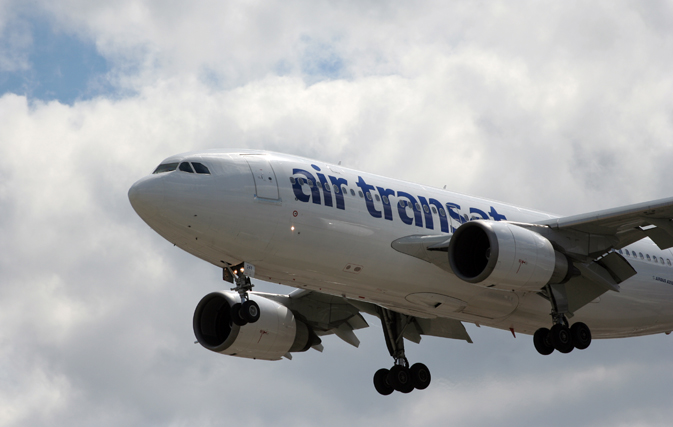MONTREAL — Air Transat says it will take “all necessary measures” to comply with directives from the Canadian Transportation Agency, after the CTA ruled that Transat bore the brunt of responsibility for the fallout surrounding hours-long tarmac delays in Ottawa this summer.
In a statement Air Transat said it acknowledged the CTA’s decision regarding the events surrounding the tarmac delays incurred by its flights from Brussels and Rome that landed at Ottawa Macdonald–Cartier International Airport this past July 31, after being rerouted because of severe weather conditions in the Montreal area.
A CTA Designated Enforcement Officer issued a penalty of $295,000 against the air carrier, however Air Transat has been advised that the penalty may be reduced by the amount of compensation provided to passengers on the affected flights, excluding the refund of out of pocket expenses.
“This is a significant determination for air passengers and air carriers. It underscores that passengers have rights and recourse when their air travel is disrupted, and that even when problems stem from events such as bad weather, there is a minimum standard of treatment to which all passengers are entitled,” said Scott Streiner, Chair and CEO of the Canadian Transportation Agency.
Transat’s initiatives include amending its tariffs and ensuring that its staff are adequately trained to meet its new commitments to passengers. The carrier has already begun implementing corrective measures and pledges to continue doing so as part of a continuous-improvement process.
“We reiterate our sincere apologies to our passengers who experienced a difficult situation,” said Air Transat President Jean-François Lemay. “For more than 30 years, we have been firmly committed to providing all of our customers with a quality experience. Air Transat welcomes the CTA’s clarification of carriers’ obligations in such circumstances and the Agency’s invitation to all industry players to improve collaboration to ensure that such a situation does not reoccur.”
As part of its ruling the CTA has ordered Air Transat to cover out-of-pocket expenses for passengers who were caught in the hours-long tarmac delay.
Air Transat says it will offer $500 to each passenger of the four flights affected by the events in question. The compensation will take into consideration sums already paid to passengers.
The CTA ruling comes almost four months after two flights – one from Rome, the other from Brussels – sat on the tarmac in Ottawa for almost five and six hours, respectively, with passengers not allowed to disembark.
Transportation agency members agree that Air Transat was not solely responsible for the delays, but said the extraordinary situation didn’t relieve Air Transat from its commitment to its customers.
One of the two aircraft ran out of fuel during the delay, then lost power, causing the air conditioning system to shut down.
During two days of hearings in August, passengers described how tensions mounted as temperatures rose. Ultimately a passenger on the Brussels flight called 911, attracting widespread media attention.
A number of people who were on board the planes told the hearings they would have given anything to be allowed to disembark, even if it meant additional delays or a two-hour drive back to Montreal.
Weather caused the two flights to be diverted to Ottawa on July 31, along with about 20 other planes in an incident that appears to have taxed airport resources in the national capital to their limit. Fuelling teams, for instance, ran out of fuel on several occasions.
Among the planes was an Airbus 380, the largest to land that day.
The need to find a place to park that Air Emirates flight forced crews to move the two Air Transat planes to the airport taxiway, where they could be neither refuelled nor serviced. As a result, they ended up being among the last planes to be refuelled.
The airline argued it shouldn’t be held liable for what happened, blaming the airport authority and refuellers among others for the delays.
The agency said Air Transat’s tariff agreement with customers is too broad and gives pilots too much discretion about when to let passengers leave an airplane, despite wording that says passengers have the option of disembarking after a 90-minute delay.
Air Transat must amend the wording to require passengers to disembark after a delay of four hours, unless there are safety, security, or air traffic control issues that prevent it, confirmed the CTA.
The airline is also being ordered to amend its rules to update passengers every 30 minutes. It also said the airline must ensure there are working bathrooms and provide medical assistance as needed during long delays.
The federal government’s proposed air passenger bill of rights, which is stuck in the Senate, would set strict new standards for airlines to follow when flights are cancelled or delayed.
With files from The Canadian Press

